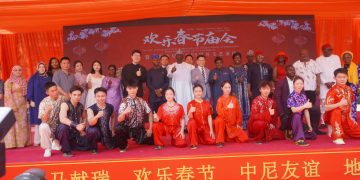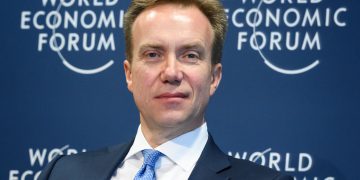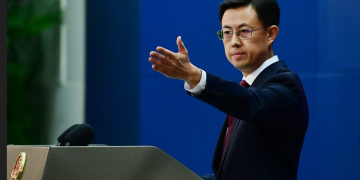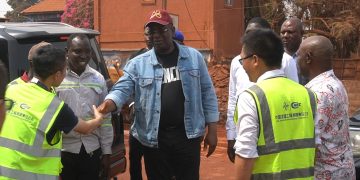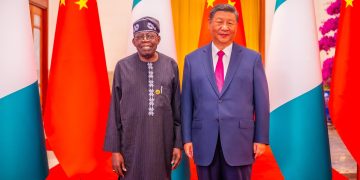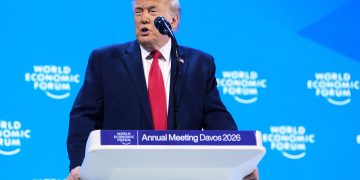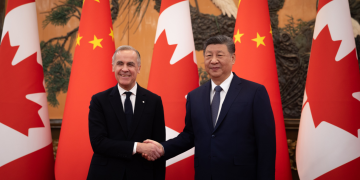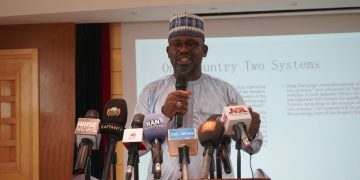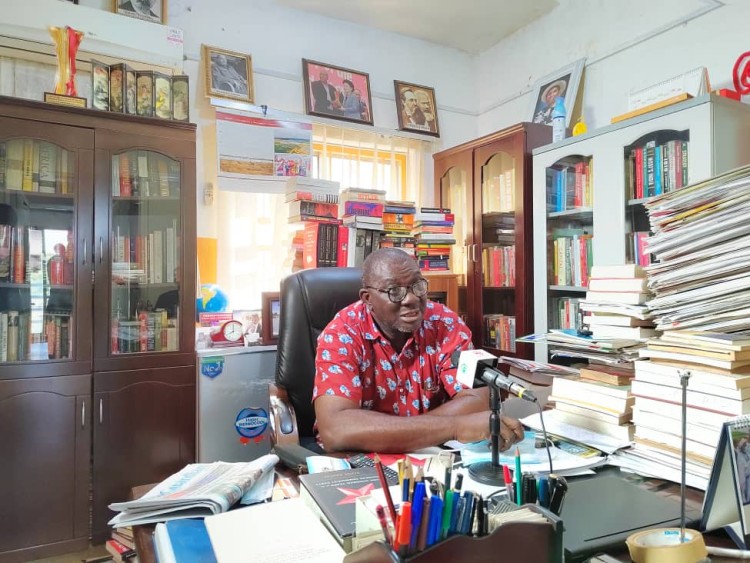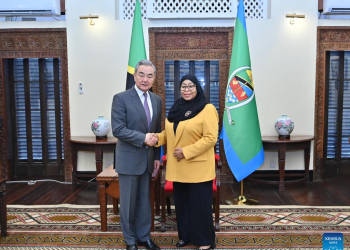In this exclusive interview, Charles Onunaiju, Director of Nigeria Center For China Studies spoke to our correspondent on China-Nigeria Cooperation, President Xi Jinping’s re-election, and other sundry issues.
Q: May We Meet You?
Onunaiju: I am Mr. Charles Onunaiju, Director, Center for China studies based here in Abuja
Q: Can you briefly describe to us the nature of Nigeria’s foreign policy since independence?
Onunaiju: Nigeria’s foreign policy has evolved. Like every other foreign policy, it was designed to secure our national interest and project it to the international system. That has been the traditional nature of our foreign policy which has evolved with time. Nigeria’s foreign policy was first and foremost designed to secure our sovereignty, and territorial integrity and within that context to engage with the international community, to build up relevant national aggregates to boost our national interest. Of course, Nigerian commitment to Africa, anti-colonialism, the fight against apartheid, and so on. Our foreign policy today is focused on engaging the international community to solve some very important existential challenges, the top of most is the security and economic well-being of the Nigerian people. Another question is whether we have built a sufficient institutional framework to advance this. Whether we have upgraded our institutional platforms in engaging the international system, whether we have re-accessed the international system lots more realistically and flow with the current change is another thing. There has been a significant change in the international system. The pivot from the Atlantic to the pacific, the rise of China, and the centrality of the Asia Pacific region. Has our foreign policy captured these trends and engaged them realistically? This a completely new question. China presents a unique opportunity not just to Africa but to the world. China is not just an opportunity to the world, the world is also an opportunity to China. How are we engaging this opportunity? Are we making the best of it? Are we engaging policy-focused? are we sitting out and letting things pass us by or letting things happen to us on their own? There are whole lots of questions.
Q: Let us mirror it down to specifics. Nigeria and China have been having bilateral ties since 1971. Can you run us through this friendship between both nations?
Onunaiju: China and Nigerian cooperation is one of the most enduring, one of the most significant. As you know, in January 1971, Nigeria and China established diplomatic relations, and soon after that the challenge of China’s formal re-admission into the United Nations was on the table, Nigeria was among the 23 African countries and 76 other countries in the world that voted overwhelmingly to have China returned into the United Nations. Resolution 1759, that iconic resolution in which the collaborators of Chiang Kia-Shek were expelled and the Peoples Republic of China was re-admitted. By the way, China was a founding member of the United Nations. China was the first signatory of the United Nations charter in 1945. Even after the new China was founded, the Chiang Kia-Shek regime illegally occupied the seat meant for China and was supported and manipulated by the west when the new China was established against their will. So Nigeria keyed in, and our cooperation with China was on the upswing immediately. By 1973, Nigerian leader, General Yakubu Gowon was in Beijing, and met the late China leader, General Mao Zedong, and cooperation has been stable. Nigeria also embrace the one-China policy which was focused essentially on having only one China in the world and Taiwan is an inalienable part of China. That has been the hallmark of Nigerian foreign policy towards China. In the 70s, 80s, and 90s, the relationship took a different turn. From being in the cooler, it became enigmatic. In 2000, the Forum of China-Africa Cooperation (FOCAC) was founded as an institutional platform to drive China-Africa cooperation. And Nigeria has always been considered a clear pacesetter. In 2005, China established what they called a strategic partnership with three countries. Egypt, South Africa, and Nigeria. Bringing Nigeria to the core of China’s foreign relations as you know, China took relations with Africa as a foundation of its foreign policy and for over 30 years, it has become a tradition for China’s foreign minister to start his work with a traditional visit to Africa. President Xi’s election to the presidency was a game-changer. In 2013, after he was elected to the presidency by the NPC, his first trip was to Russia and after Russia, Africa. He went straight to Tanzania and delivered his pivotal framework on China-Africa cooperation enumerating that China, no matter what will consider her relationship with Africa as concrete. So these are the trajectory of China-Africa cooperation. As you know in recent times, it becomes enigmatic.
The Belt and Road process, most African countries Africa has the largest number of countries in any region to sign the memorandum of understanding of the belt and road process. With that framework, Nigeria is at the forefront of the early harvest of the belt and road process. In the next few days the Lekki Deep Sea Port, Nigeria’s first-ever deep sea port will be launched. It is believed that the seaport will generate up to 200,000 jobs, provide revenue worth almost N400 billion to various ties of the Nigerian government, and cut the cost of doing business in Nigeria especially the maritime component by almost half. These are the early clear harvest of China-Nigeria cooperation within the framework of the Belt and Road initiative. Several power plants have gone upstream, and railway lines and road networks have all come upstream. As you know, almost more than 200 Chinese companies are participating in Nigeria’s re-industrialization. The Gwandon export promotion center, the Lekki free trade, and the Calabar free trade zone are all harvests of our cooperation with China.
Q: The Chinese government recently provided capital for the revitalization of critical infrastructures in Nigeria such as rail lines, airports, roads, and so on. How significant are these projects to the Nigerian economy?
Onunaiju: These are very significant. They are generating local jobs. For several years in the 70s, and in the 80s, some of the issues within academia and the general public is the transfer of technology. Here we have Nigeria and China working together, you can find Nigerians in the middle and top cadre of various Chinese companies, there is the engagement you know and what we see is massive employment. If you read the report of McKinsey and Company, a global management consortium published a report in 2017, called the Dance of the Dragon and Lion. It outlined that China is head and shoulder above every other country in the world concerning Africa when it comes to aiding, investment, and trade.
Over 20,000 jobs have been created across Africa with the domestication of Chinese companies in Africa and more are to come. These things are the economic trend. China is becoming a middle-income county. Most of the companies will have to relocate to where labor cost is reasonably cheap. And Africa is a choice. This was the advantage China enjoyed 40 years ago when it became the workshop of the world. Because of relatively cheaper labor costs. Companies from Europe, America, and Japan were relocating to China. Today, Africa holds the same advantage of relatively labour low costs and Chinese companies are flocking here. What we need are institutional rules. We need to standardize the rules. Provide security, and we can be sure that Africa and Nigeria in particular are poised to be the next industrial frontier or if you like the next workshop of the world.
The Chinese companies moving to Africa and Nigeria are not out of charity but because Africa presents a new opportunity for these companies. So we are going to see what we call Made in Africa with China in a very short period. The question is, how are our leaders positioning themselves to relevant policy frameworks to engage these opportunities? Is still an open question to be answered. How are we engaging just as the McKenzie report preached? How are various African countries engaging the opportunities of China? Some are engaging it policy-wise, some are waiting for it to fall on their feet, some are more proactive, and some are more active. So how are we going to respond to the opportunity of China especially to Africa as it relates to the economic renaissance in Africa? This is a question for the leadership, policymakers, and even for research centers like ours.
Q: In a nutshell, these interventions by the Chinese government and the projects executed by Nigeria through these funds have impacted significantly on the economy.
Onunaiju: Absolutely. As I have just told you, the Lekki Deep Sea Port was an almost $ 2 billion project invested by the Chinese and contracted to them. So what we are going to see is a massive injection, and revival of Nigeria’s maritime industry, putting Nigeria as a hub of the maritime industry in West Africa. For the first time, we are going to have a deep sea port, big ships will be coming. That is why our people travel to Cotonou to clear their goods because they have a deep sea port and it’s cheaper to clear there. Now with Lekki Deep Sea Port, there will be no need for that because we can have big ships making calls to our ports. This is the first-ever Nigeria Deep Sea Port. What we have before now is a seaport but not a deep sea port and now we are going to have it and this is thanks to our engagement with China through the Belt and Road Initiative. This initiative consists of infrastructure construction both maritime, over land, sky, and fiber. So this is a major component, a very clear harvest of our engagement with China under the framework of the Belt and Road Initiative.
Q: It has been argued in some quarters that the presence of Chinese business interest in Nigeria is another form of new colonialism. Do you share in this assertion?
Onunaiju: Well, these kinds of views do not originate from Africa. It did not originate from China or Nigeria. It is people who would want us to remain poor, aid recipients, and remain where we are, that are manipulating these views. The record is very clear. We have our rail back on track, I am sure there are lots of young people who never saw a train, but today the trains are back. Recall that the United States recently published its strategy for Africa and the opening line is that the US is going to work with Africa to contend with what they call the harmful effect of China and Russia in Africa. And the question we ask is what are the harmful effects? Roads were built, ports were constructed, power plants were built, schools were built, and hospitals were built. If these are all harmful effects, Africa needs just more of them. I can assure you, that neo-colonialism is a very harsh word. China itself was a victim, not just of colonialism, but vicious colonialism of several countries. At the turn of the 20th century, Beijing itself was occupied by seven allied powers. And the 19th century is what the Chinese call century of humiliation, in which China was partitioned into spheres of influence. If you remember, the seizure of Hong Kong, Macau, and so many others forced the Qin Chi’n Dynasty to sign a concession, including a concession to sell Narcotics to China, the Opium war. These are all that China experienced. China experienced colonialism and racism even in Shanghai where you have many concessions in the early 20s. There are signs that Chinese and dogs are not allowed here. These are the extent to which the Chinese were treated. So the Chinese understand the excruciating pains, and torture that comes with neo-colonialism and they are not in any position to do that. The nature of the Communist Party, and the nature of new China has nothing underlying its structure, outlook, or mechanism that comes close to colonialism or neo-colonialism. These are ideological slander that has no validity with the facts on the ground especially in Africa and in Nigeria. I think the Chinese companies in Nigeria are keen to re-building Nigeria’s industrial prospects. They are working very hard with their Nigerian counterparts. Of course, they may be one or two issues. Like Deng Xiaoping, the Chinese reform leader said, “if you open your window to get some fresh air, some insects might fly in”. But a wise man will not shut the window of the fresh air simply because an insect flew in. China-Nigeria cooperation is a work in progress. There could be one or two issues, but the only way to resolve issues within the Nigeria-China cooperation is more cooperation not less. Do I see a very bright prospect on a trajectory of development? We are on a trajectory of evolving this cooperation into a very robust mechanism to re-engage Africa to the time of global value chain, bringing Africa back to the global industrial value chain, bringing Africa back into the mainstream of the global economy, bringing Africa to participate in the fourth industrial revolution, and positioning Africa as the next workshop of the world. That is the prospect.
Q: The Communist Party recently held its 20th National Congress where President Xi was elected for another five years in office. How will the election of President Xi impact the future of China and trade with Africa and Nigeria?
Onunaiju: Let me say very frankly since the 18th National Congress where President Xi was elected General Secretary of the party, the profile of China-Africa has significantly increased. In 2015, we had the epoch-making second China-Africa summit held in Johannesburg, South Africa. President Xi outlined the ten cooperation plans including industrialization, infrastructure, construction, and a whole range of activities. In 2018, at the Beijing third Africa-China summit, President Xi outlined another ten initiatives which reinforced all of these. These were very enabling. They were epoch-making, trailblazers in terms of engaging Africa in the challenges that we understand to be existential to Africa. Infrastructure construction went up massively, and outcomes are very rife for all to see. The first electrified railway from Ethiopian Industrial Heartland to Djibouti. Ethiopia is a landlocked country with no access to the sea. But with the construction of the highway, travel time was cut from five days to eight hours. The Mombasa-Nairobi railway line standard Guage. I was in Mombasa, I saw the port of Mombasa being revived, being linked to Kenya by railway. I was in the industrial heartland of Ethiopia. These are all major, breakthroughs that we saw. The Port of Benguela in Angola, the port in Tanzania, Zambia, everywhere. Africa was back to reckoning. Both as an economic power and a significant player in the scheme of things. China gave a tremendous boost to Africa as a key global player and today there is no ministry of foreign affairs in the world that does not have a department of African Affairs. Before China’s engagement, African Affairs were sublet to film actors and musicians. We see them come to Africa and visit refugee camps and demonstrate their humanity. That sight is no more. What we see today is construction sites with China and African technicians comparing notes. This is not palatable to most people in the West. Their Prime Time television of refugee camps where children are squatting with a sprinkle of Western show business giving aid, feeding them with bread is no longer there. What you see on Prime Time now is skyrise in Africa, Chinese and African Engineers comparing notes on project sites. This is not very pleasant to some people in Europe and America where Africa is supposed to be poor, an object of pity, an object of Humanitarian concern. China elevated the profile of Africa. As I told you, no Foreign Ministry anywhere in the world can afford to ignore Africa. This is basically on account of the enigmatic, epochal cooperation between China and Africa. From the founding of FOCAC to date, China has never missed a single edition no matter what the world has become. Each edition delivers a practical roadmap to enriching China-Africa cooperation. FOCAC does not have big officials or Secretariat but it is a process, a mechanism that continuously evolves and works. It has within it, a follow-up mechanism that there are no dull moments in China-Africa cooperation. I have had the privilege to offer advisories to some countries that wanted China-Africa cooperation. How did the Chinese get it right Within the framework of FOCAC?
It is a practical process with tangible outcomes at every edition and since the coming of President Xi, it has taken a significant improvement dimension.
Last year in Senegal, President Xi outlined another nine programs to drive China-Africa cooperation. One of the most interesting I found is China’s plans to establish a green lane to allow the export of 300 billion worth of agricultural products from Africa to China. We talking about diversification. What can be more important than Africa having a guaranteed market of 300 billion worth of agricultural products in the next three years? Think of the American African Growth Opportunity. From the early stage when it netted 108 billion, today it is less than 64 billion. Most African countries have been sent packing from the organization for politically motivated reasons. The latest is Ethiopia, Mali, and Guinea with claims that they are regressing on human rights. People who are regressing from human rights, you remove from economic activities that will improve the lives of people, and their wellness and help them challenge the regression in their human rights. You are putting them down. That is what our western friends do. China believes you have to provide the condition for people to be aware of their rights and enjoy them. I think it is very apt to say that China-Africa cooperation is a historic opportunity for Africa. My hope and concern are that Africa takes this very seriously. In all history of African international partnerships, there is no time we have found a partner who is able and willing like China. In the past, we have had partners that are willing but not able, and others who are able but not willing. In China, we have a partner that is able and willing to support Africa in engaging the challenges confronting us today. For me, China is Africa’s historic opportunity. I hope African leadership and policymakers will leverage the opportunities of China and engage some of our serious existential issues.
Q: In a nutshell, the election of President Xi will further strengthen ties between China, Africa, and Nigeria.
Onunaiju: Absolutely. Strengthening ties look too abstract. We look forward to more concrete outcomes in China-Nigeria relations in the next five years. From this 20th congress to the next congress in 2027, we will see a more tangible outcome. We will see more practical outcomes. We will see a significant improvement in China’s input into Africa’s existential challenge. We will see all-around cooperation, concrete deliverables, and practical tangible outcomes in China-Africa cooperation in the next five years.
Q: If you’re to advise President Xi. Aside from intervention in infrastructure, what other aspect do you think the Chinese president should Focus on?
Onunaiju: I would want China to strengthen its cooperation with governance sharing experience. We need to share more experience on governance issues. The economic section is a work in progress, making significant headway. What is unique about China that has made it make so much progress within a short time? We want to share the governance experience of China. Let’s compare notes on governance issues, let’s compare notes on institution building, and let’s compare notes on process establishment, and rules. These are challenges. Of course, as you know, China is China, and despite the confluence of external influences, China evolves its original outlook. We can engage China’s experience in governance, without becoming Chinese or China. It can be used to enrich our process of development without altering our indigenous outlook on governance. Despite many years of multi-party processes, it has not solved the problem. Multi-party competition. What is interesting about China Multi party consultation and multi-party cooperation? These are key elements. Building national consensus on the critical roadmap for development. We must find a way of building a consensus, and inclusion. These are elements of China’s outlook that is important for Africa to engage.
Again we cannot replicate what China has done because China’s experience is uniquely Chinese. But we can tap into the experience and this can help us to develop our outlook. As President Xi would say, “there are several roads to Rome”, there are many roads to modernization there is no one way to modernization. China has found the China way to modernization and it is generating and bringing results. We can also find the Nigerian way to modernization. We can build a Nigerian democracy. A democracy with Nigerian characteristics that engage our reality, interrogates our reality, and engages it in our institution building, in evolving our process and rules. There are wide areas of engagement. Sharing governance experience is one area I would like to see more cooperation. More comparing of notes so that we can reflect a lot more wisely, a lot more soberly on why we are where we are when we are supposed to be somewhere ahead.
I believe that the China experience will provide us with some very important inputs into our reflection on where we should be. So I want governance experience sharing to become a center of China-Africa cooperation. I want China to speak more, and open up more about its processes. Of course, as China would always say, “we do not export our system, we do not force anybody to receive it, but we are willing to share our experiences.”
I want African leadership to take China’s experience more seriously. Look at the National Peoples Parliament, it’s a part-time arrangement. When they convene, they elect a standing committee that oversees the work of the parliament. They convene once a year to examine the report of the standing committee. The second chamber, China Peoples Consultative Conference is an advisory body of all Chinese of all shades, ethnic groups, religious groups, professionals, women, and Chinese in the Diaspora. Why can’t we have a representative institution that accommodates different shades of opinion so that we can represent reality and not the abstract geographical void of what we call a constituency? There is so much to engage as far as China’s governing process is concerned, not to replicate what the Chinese have done, but to evolve our original framework of governance that works for us.
Q: Where do you see Nigeria-China friendship in the next 50 years?
Onunaiju: It is a work in progress, and it will continue to evolve. It’s been practical, it’s been fulfilling, it’s been problem-solving and carried out with the greatest sincerity on both sides. China does not manipulate, China does not play one county against another. China treats every country as equal, within the family of the FOCAC, no county is manipulated against the other. There is no rivalry. China does not hold a special place for one another. It’s an open space for engagement. As far as the communist party is concerned, Africa can always have its place right at the heart of China’s foreign policy not only in the next 50 years but in the next 100 years. China-Africa cooperation will grow from strength to strength, become more problem-solving, more goal-oriented, and will become more practical bringing more benefit to both sides.
Q: How will you describe the Chinese people generally?
Onunaiju: I have had lots of Chinese friends from several works of life. We speak frankly, we speak honestly. I advocate more truth-telling. When two brothers go into a room to talk and they both come out smiling, maybe they haven’t told each other the truth. Sometimes, China should learn how to speak the truth to Africa, especially its leadership and we also can do the same. My experience with the Chinese I met is impressive, people who have respect for productivity, people who have no time to waste, no time for frivolity, and they are very business minded. Of course, there is the human side, fun and all that but it’s always production-focused and aimed at generating results. It’s hard to find a Chinese who is ready to while away time without aiming at producing a particular result that will be beneficial to both sides. We engage robustly and enrich each other with our different experiences. There are of course light moments to share jokes and all that, but generally, these are people focused on results-oriented engagement at all times at both various levels of interaction.
END

